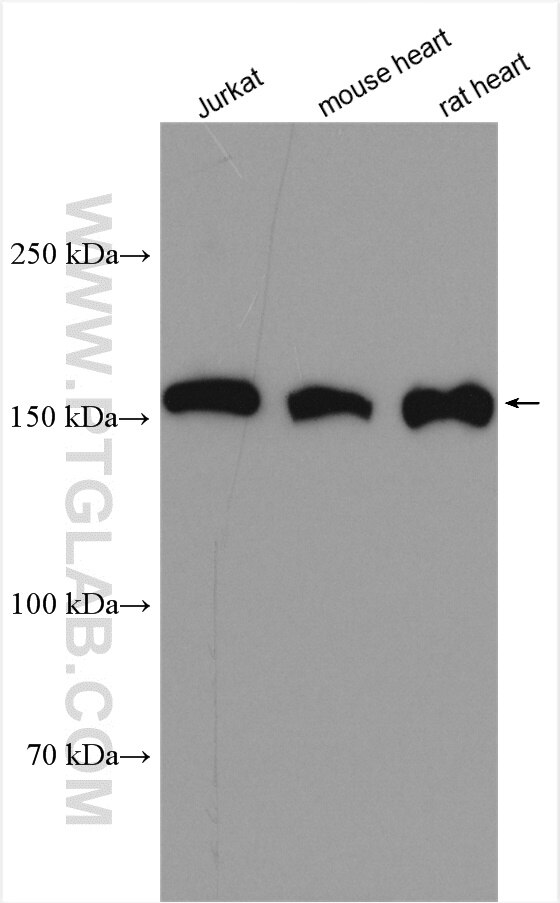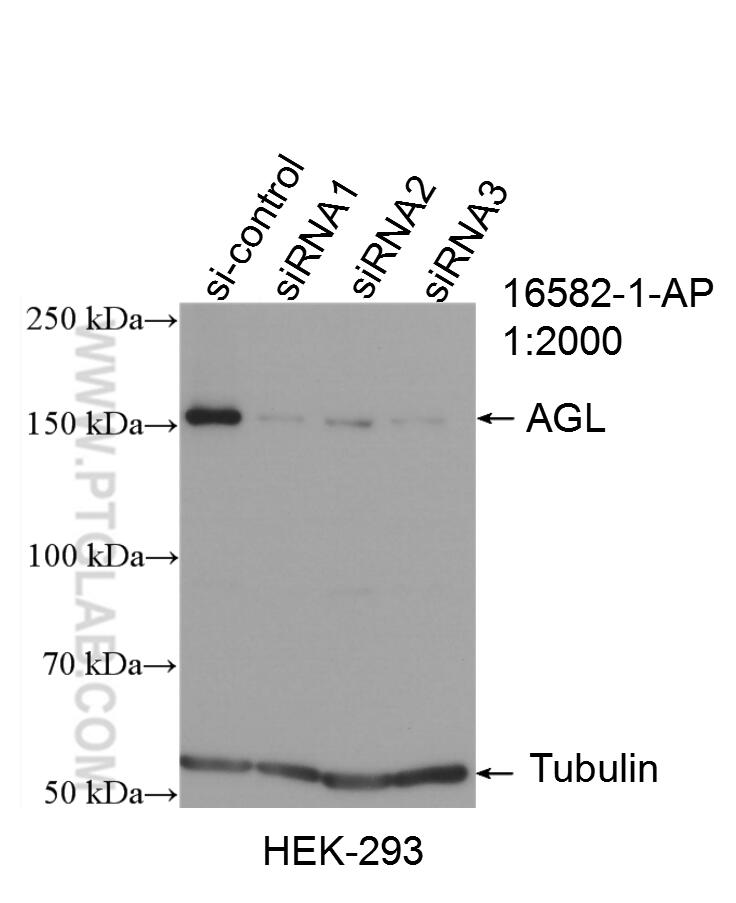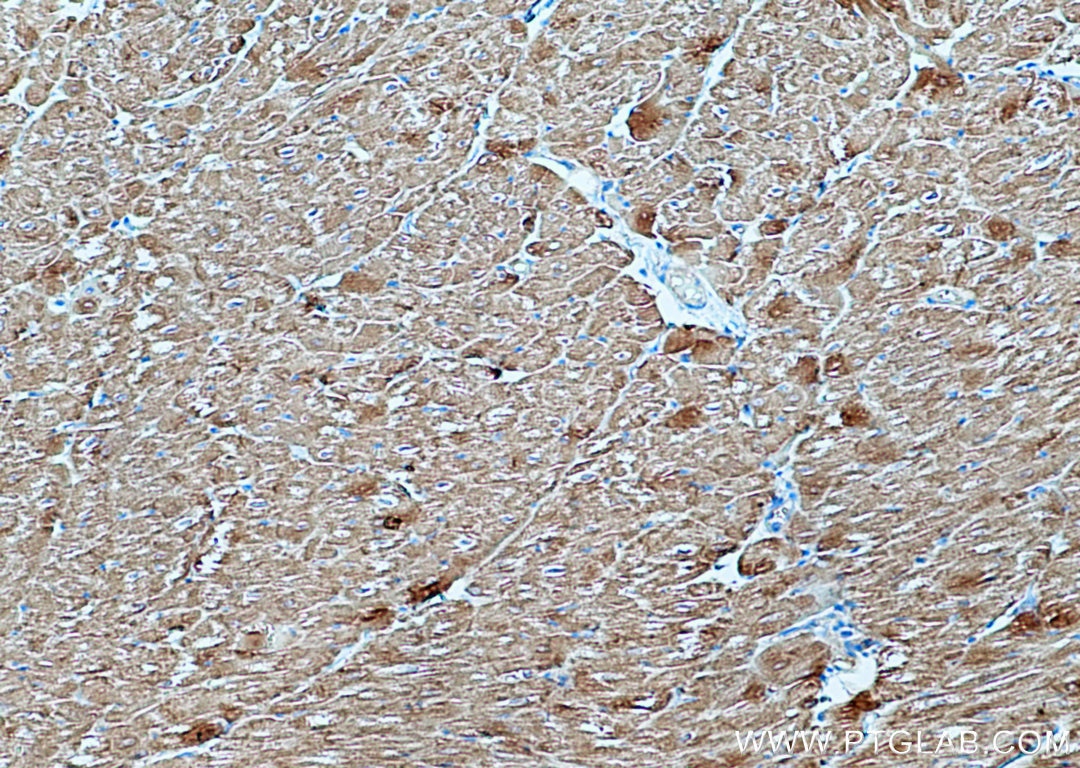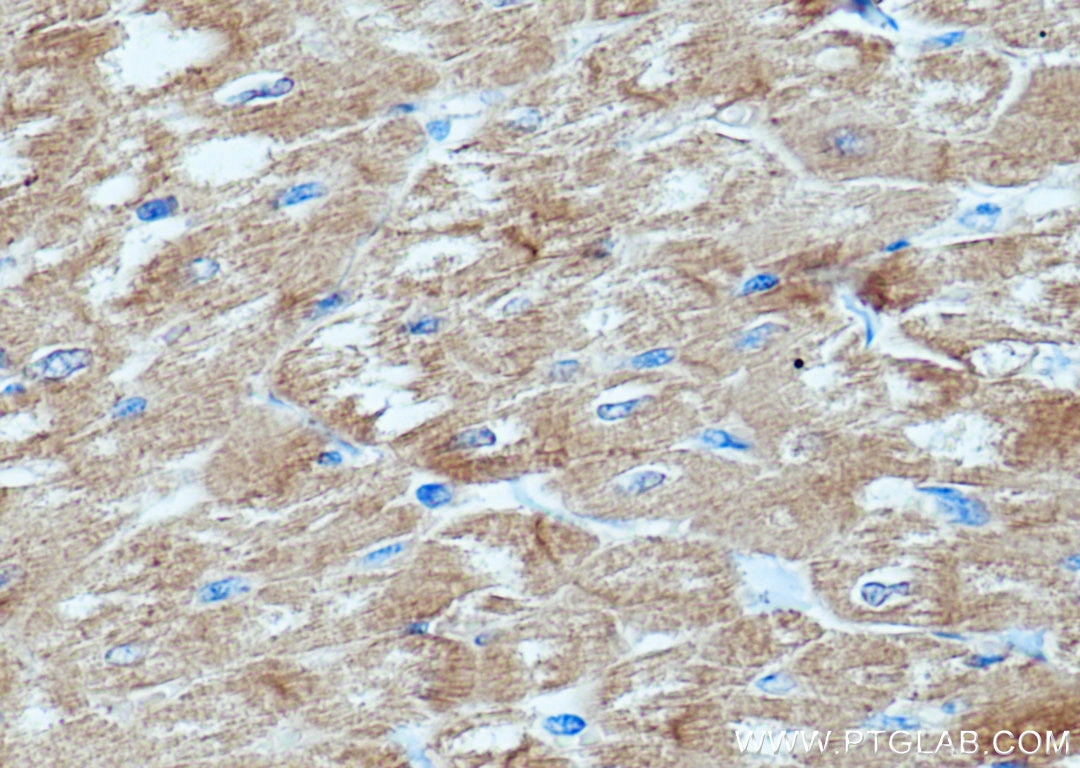- Featured Product
- KD/KO Validated
AGL Polyklonaler Antikörper
AGL Polyklonal Antikörper für WB, IHC, ELISA
Wirt / Isotyp
Kaninchen / IgG
Getestete Reaktivität
human, Maus, Ratte
Anwendung
WB, IHC, ELISA
Konjugation
Unkonjugiert
Kat-Nr. : 16582-1-AP
Synonyme
Geprüfte Anwendungen
| Erfolgreiche Detektion in WB | Jurkat-Zellen, HEK-293-Zellen, Mausherzgewebe, Rattenherzgewebe |
| Erfolgreiche Detektion in IHC | humanes Herzgewebe Hinweis: Antigendemaskierung mit TE-Puffer pH 9,0 empfohlen. (*) Wahlweise kann die Antigendemaskierung auch mit Citratpuffer pH 6,0 erfolgen. |
Empfohlene Verdünnung
| Anwendung | Verdünnung |
|---|---|
| Western Blot (WB) | WB : 1:1000-1:8000 |
| Immunhistochemie (IHC) | IHC : 1:50-1:500 |
| It is recommended that this reagent should be titrated in each testing system to obtain optimal results. | |
| Sample-dependent, check data in validation data gallery | |
Veröffentlichte Anwendungen
| WB | See 6 publications below |
Produktinformation
16582-1-AP bindet in WB, IHC, ELISA AGL und zeigt Reaktivität mit human, Maus, Ratten
| Getestete Reaktivität | human, Maus, Ratte |
| In Publikationen genannte Reaktivität | human, Maus, Ratte |
| Wirt / Isotyp | Kaninchen / IgG |
| Klonalität | Polyklonal |
| Typ | Antikörper |
| Immunogen | AGL fusion protein Ag9962 |
| Vollständiger Name | amylo-1, 6-glucosidase, 4-alpha-glucanotransferase |
| Berechnetes Molekulargewicht | 1532 aa, 175 kDa |
| Beobachtetes Molekulargewicht | 165 kDa |
| GenBank-Zugangsnummer | BC078663 |
| Gene symbol | AGL |
| Gene ID (NCBI) | 178 |
| Konjugation | Unkonjugiert |
| Form | Liquid |
| Reinigungsmethode | Antigen-Affinitätsreinigung |
| Lagerungspuffer | PBS with 0.02% sodium azide and 50% glycerol |
| Lagerungsbedingungen | Bei -20°C lagern. Nach dem Versand ein Jahr lang stabil Aliquotieren ist bei -20oC Lagerung nicht notwendig. 20ul Größen enthalten 0,1% BSA. |
Hintergrundinformationen
Amylo-alpha-1-6-glucosidase-4-alpha-glucanotransferase (AGL) (also known as glycogen debranching enzyme) is a critical bifunctional enzyme involved in glycogen metabolism.
Protokolle
| PRODUKTSPEZIFISCHE PROTOKOLLE | |
|---|---|
| WB protocol for AGL antibody 16582-1-AP | Protokoll herunterladen |
| IHC protocol for AGL antibody 16582-1-AP | Protokoll herunterladenl |
| STANDARD-PROTOKOLLE | |
|---|---|
| Klicken Sie hier, um unsere Standardprotokolle anzuzeigen |
Publikationen
| Species | Application | Title |
|---|---|---|
J Clin Invest A functional mini-GDE transgene corrects impairment in models of glycogen storage disease type III | ||
iScience MYCT1 alters the glycogen shunt by regulating selective translation of RACK1-mediated enzymes. | ||
PLoS One A novel genetic model provides a unique perspective on the relationship between postexercise glycogen concentration and increases in the abundance of key metabolic proteins after acute exercise | ||
JCI Insight Synergism of dual AAV gene therapy and rapamycin rescues GSDIII phenotype in muscle and liver | ||
Stem Cell Res Generation of three induced pluripotent stem cell lines from patients with glycogen storage disease type III |
Rezensionen
The reviews below have been submitted by verified Proteintech customers who received an incentive for providing their feedback.
FH Pierre-Romain (Verified Customer) (09-18-2025) | work well
|
FH Jeremy (Verified Customer) (09-08-2019) | Highly sensitive for the detection of Agl protein in different tissue including Heart, Diaphragm and different muscles
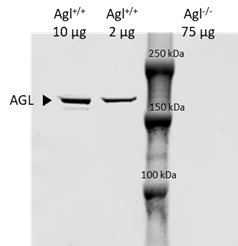 |
